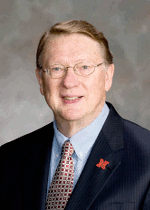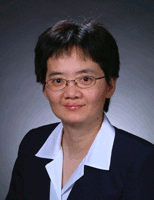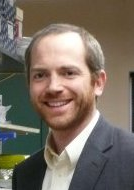A Presidential Initiative for Interdisciplinary Research
A Presidential Initiative for Interdisciplinary Research
The symposium on Genome Editing: Foundations and Applications will be held at the Iowa State University Alumni Center from the afternoon of April 9 through the morning of April 11. The symposium will bring together leaders who are developing genome editing resources and tools and applying them in a wide variety of organisms. The main focus will be on the foundations and applications of TALEN and CRISPR/cas technologies in crop plant species. Topics covered in the symposium will range from the biological roles of TAL effectors and CRISPR/cas systems in their native contexts, proof-of-concept experiments, and successful applications of the technologies. The symposium is hosted by the ISU Crop Bioengineering Consortium, which seeks to address the urgent, grand challenge to provide sufficient food, feed, biofuels and biorenewable chemicals for the world's burgeoning population, through basic and applied research to enable the bioengineering of valuable traits in a variety of crops.
| 1:00 PM | 2:00 PM | Registration |
| 2:00 PM | 2:30 PM | Opening Remarks |
Steven Leath, President Iowa State University Marty Spalding, CBC Director Iowa State University Steve Whitham, Co-Chair Iowa State University Erik Volbrecht, Co-Chair Iowa State University |
| 2:30 PM | 3:20 PM | TAL Effectors | Adam Bogdanove Cornell University |
| 3:20 PM | 4:10 PM | CRISPR/Cas systems: From adaptive immunity to adopted biotechnology | Dipali Sashital Iowa State University |
| 4:10 PM | 4:40 PM | Break (North Ballroom) | |
| 4:40 PM | 5:30 PM | Targeted genome editing in rice using CRISPR and TALEN | Bing Yang Iowa State University |
| 6:00 PM | 8:30 PM | Dinner |
| 7:30 AM | 8:30 AM | Continental Breakfast |
| 8:30 AM | 9:20 AM | RNA-guided Genome Engineering Using CRISPR-Cas9 Systems: Toolbox Expansion and New Application |
Le Cong Broad Institute of MIT & Harvard |
| 9:20 AM | 10:10 AM | Gene Editing in Chlamydomonas reinhardtii: Challenges and Progress | Don Weeks & Wenzhi Jiang University of Nebraska |
| 10:10 AM | 10:30 AM | Break (North Ballroom) | |
| 10:30 AM | 11:20 AM | CTGA: The CRISPR TALEN genome analyzer | Carolyn Lawrence Iowa State University |
| 11:20 AM | 12:10 PM | Commercialization of non-transgenic breeding technologies | Noel Sauer Cibus |
| 12:10 PM | 2:00 PM | Lunch | |
| Posters | |||
| 2:00 PM | 2:50 PM | All in the Family: Understanding soybean gene redundancies through genome engineering | Bob Stupar University of Minnesota |
| 2:50 PM | 3:40 PM | How do you CRISPR? Creating and evaluating DNA modifications in soybean and poplar | Thomas Jacobs Boyce Thompson Institute |
| 3:40 PM | 4:00 PM | Break | |
| 4:00 PM | 4:50 PM | Development of user-friendly tools for targeted genome editing | Keming Song Sigma-Aldrich |
| 4:50 PM | 5:40 PM | Plant genetic transformation in the era of genome editing | Kan Wang Iowa State University |
| 6:00 PM | 7:30 PM | Dinner | |
| 7:30 PM | 8:20 PM | Optimizing gene targeting strategies in plants | Dan Voytas University of Minnesota |
| 8:20 PM | 10:00 PM | Reception | |
| 8:00 AM | 9:00 AM | Continental Breakfast |
| 9:00 AM | 9:50 AM | Cas9/guideRNA targeted mutagenesis and precise gene editing and insertions in maize | Mark Cigan DuPont Pioneer |
| 9:50 AM | 10:40 AM | TALE Activation of Endogenous Genes in Chlamydomonas | Marty Spalding, CBC Director Iowa State University |
| 10:40 AM | 11:00 AM | Break | |
| 11:00 AM | 11:50 AM | Engineering Diversity - A Synthetic Biology Approach | Nicola Patron The Sainsbury Laboratory |
| 11:50 AM | 12:30 PM | Closing Remarks | |

Adam Bogdanove is a professor of Plant Pathology and Plant-Microbe Biology at Cornell University. His research centers on diseases of rice caused by the bacterial species Xanthomonas oryzae, with a special focus on TAL effectors. TAL effectors are transcription factors injected by the bacterium into the plant to activate host genes during infection. Bogdanove discovered the modular mechanism by which TAL effectors recognize their DNA targets and has pioneered the use of TAL effectors as customizable DNA targeting domains for a variety of applications including genome editing and synthetic biology. Bogdanove earned his bachelor's of science in Biology at Yale University in 1987, and his PhD in Plant Pathology at Cornell University in 1997. Following postdoctoral work at Purdue University and later at the Boyce Thompson Institute, Bogdanove joined the faculty of Plant Pathology at Iowa State University in 2000. Bogdanove moved to Cornell in 2012.

Le Cong is from Beijing, China. He studied electronic engineering and biology at Tsinghua University receiving B.S., summa cum laude, in 2009. Afterwards, he completed his PhD degree at Harvard University, co-advised by Drs. Feng Zhang and George Church and was a HHMI International Research Fellow. In the Zhang lab, he did pioneering work on genetic and epigenetic engineering, focusing on developing technologies based on TALE and CRISPR-Cas9 systems and their applications. He is now a postdoc with Dr. Aviv Regev at the Broad Institute working on systems biology.

Nicola Patron is a molecular and synthetic biologist interested in natural and engineered transfers of genetic material. Her postgraduate work studied genetic exchanges between plant viruses and crops and in post-doctoral research at the University of British Columbia she studied gene transfers from symbionts. In Australia, Nicola worked with industry to develop site-specific nuclease technologies for targeted gene transfers to crop species. In 2013, Nicola returned to the UK to start a Synthetic Biology group at The Sainsbury Laboratory where she is focused on developing tools and standards for engineering plant genomes.

Noel Sauer is the Director of Technology at Cibus. Dr. Sauer earned her B.S. degree in Biological Sciences from the University of Southern California, and a doctoral degree in Microbiology and Molecular Genetics from Harvard University. For her postdoc, Dr. Sauer joined Massachusetts General Hospital, Harvard Medical School, studying host-pathogen interactions. At Cibus, she is responsible for leading a team of innovative scientists towards the development of non-transgenic traits in commercially relevant crops by revolutionizing the field of precision gene editing in plants.

Dr. Spalding, Professor, received a B.S. in both Environmental Science and Biochemistry in 1974, and an M.S. in Botany in 1976, from Washington State University. He received his Ph.D in Plant Physiology from the University of Wisconsin in 1979. Dr. Spalding completed a postdoctoral program at the University of Illinois in 1982 and was a visiting postdoctoral fellow at The Australian National University later that same year. In 1982-1983 Dr. Spalding completed a postdoctoral program at Michigan State University. He joined Iowa State University in 1984 as an Assistant Professor. Dr. Spalding served as chair of the Interdepartmental Plant Physiology program at ISU from 1992 until 2000. In July 2003, he assumed the position of Chair of the GDCB Department. In July 2011, he became Interim Associate Dean for Research and Graduate Studies in the College of Liberal Arts and Sciences and on January 1, 2013, formally accepted the position of Associate Dean.

Dr. Vollbrecht, Associate Professor, received his Ph.D. from the University of California, Berkeley, in 1997, studying genetic mechanisms of plant reproduction and molecular genetic regulation of plant development. He was then a DOE-Energy Biosciences post doctoral fellow of the Life Sciences Research Foundation at Cold Spring Harbor Laboratory in New York. At Iowa State, Vollbrecht is studying plant developmental mechanisms.

Donald P. Weeks, Ph.D., is the Maxcy Professor of Agriculture and Natural Resources in the Department of Biochemistry at the University of Nebraska-Lincoln. He received his Bachelor of Science degree from Purdue University and his Ph.D. degree from the University of Illinois-Champaign/Urbana. He has held professional positions at the Fox Chase Cancer Center in Philadelphia, the Zoecon Research Institute of Sandoz Agro, Inc. in Palo Alto before joining UNL in 1989. Weeks is a Plant Molecular Biologist and Biochemist. His earliest scientific contributions included discovery of mechanisms involved in protein synthesis in eukaryotic cells and development of systems for studies of gene regulation in plants and algae. He was a pioneer in the adoption of molecular biology and recombinant DNA technologies in biological research. The Weeks laboratory at UNL was responsible for the development of dicamba herbicide resistance gene technology that soon will be commercialized by Monsanto. Most recently, this laboratory has been involved in innovative research aimed at developing and applying new methods for targeted gene knockout and gene replacement for use in improving important food crops.

Professor Yang received his B.S. in 1986 and his M.Sc. in 1989 from Southwest Forestry College in China. In 2000, he received his Ph.D. from Kansas State University, where he continued his studies as a postdoctoral research fellow from 2001-2004. From 2004-2006, he was Research Assistant Professor of Plant Pathology at KSU. In 2007, he became Assistant Professor in Genetics, Development and Cell Biology at Iowa State University and in 2013 was promoted to Associate Professor with tenure.

Professor Kan Wang graduated with her BS in Biochemistry from Fudan University in Shanghai, China. She was sponsored first by the Chinese government then by the Rockefeller Foundation to conduct graduate study under the supervision of Drs. Marc Van Montagu (2013 World Food Prize Laureate) and late Jeff Schell in Ghent University, Ghent, Belgium, the first group that discovered and engineered Agrobacterium tumefaciens for plant genetic transformation. Her PhD study and postdoctoral research were focused on the molecular mechanisms of the T-DNA transfer from Agrobacterium tumefaciens to plant cells. She is regarded as one of the pioneers in understanding the mechanism of DNA transfer from Agrobacterium to plants (Wang et al., Cell, 1984; Science 1987), a fundamental knowledge that became the corner stone for building of tools for plant genetic transformation. Dr. Wang spent 7 years in ICI seeds (now Syngenta) as a project leader in genetic transformation of corn and soybean. Since 1996, she took a position at Iowa State University and established the first public crop transformation facility, which provides genetic transformation services of corn, soybean, and rice for the research communities. Dr. Wang’s research interests include exploring novel plant genetic transformation technology, developing a production system for corn-based pharmaceutical and industrial products and investigating the functional roles of Agrobacterium non-coding RNAs. Dr. Wang currently is a professor in the Department of Agronomy, Director of the Center for Plant Transformation and Co-PI of the Crop Bioengineering Consortium at Iowa State University.

Mark Cigan is a senior research scientist at Pioneer Hi-Bred International; DuPont’s Agricultural Biotechnology group in Johnston, Iowa. He has been directly involved in the development of new hybrid seed production systems for a variety of crops at Pioneer for approximately 15 years. For the last three years, Cigan has been a member of the Trait Technologies group managing various projects involving site-specific genome modification in corn, rice and sorghum. Prior to working on plants, Cigan was a National Research Council Fellow at the National Institutes of Health in Bethesda, Md., in the laboratory of Dr. Alan Hinnebusch where he used biochemical approaches to understand novel regulation of a transcription factor in yeast. Cigan holds a doctorate in Genetics and Molecular Biology from Northwestern University, Medical School in Chicago, Ill., and a master’s degree in Molecular Biology from the University of Wisconsin-Milwaukee.

Tom Jacobs is a postdoctoral scientist at the Boyce Thompson Institute for Plant Research. He is currently working in Dr. Gregory Martin’s laboratory using genome editing approaches to study plant-pathogen interactions. Tom received his PhD from the University of Georgia in 2014 under the direction of Dr. Wayne Parrott. In the Parrott lab he developed several molecular tools for functional genomics in soybean. His career interest is to use plant biotechnology to improve crop plants.

Dr. Lawrence’s group develops computational systems and tools that enable researchers to leverage plant genetics and genomics information to better understand basic biology as well as to engineer improved plants. Her group is interested in application of technologies to predict plant phenotype and coordinates activities to overcome challenges in the emerging field of high-throughput phenotyping. Although work by group members is not specifically limited to maize, it is by far the group’s favorite model system.

Dipali Sashital is an assistant professor in the Department of Biochemistry, Biophysics & Molecular Biology at Iowa State University. She received her PhD from the University of Wisconsin, Madison, in 2006. Her primary research interests are the structure and function of RNA-protein complexes, and specifically the mechanisms of CRISPR-Cas RNA-guided adaptive immunity.

Keming Song is a Research Fellow at Sigma-Aldrich Corporation (USA), responsible for prospecting new platform technologies and establishing external scientific collaborations. His current interest is to find new technologies in high throughput genotyping by next generation sequencing, targeted genome editing, and single cell analysis for cancer biomarker discovery. Song has more than 25 years of research experience in diverse fields of life sciences, particularly in genetics, cell biology, and molecular biology. He joined Sigma in 1998 and has served as group leader and R&D manager for several research teams and has developed/directed development of many commercial products covering nucleic acid amplification, recombinant protein expression, plant biotechnology, and cell biology fields. Before joining Sigma, Song served as senior scientist and team leader at Johnson & Johnson Clinical Diagnostics and Applied Biosystems (now Life Technology) and developed products for clinical diagnostics. Song obtained his Ph. D. in plant breeding and plant genetics from University Wisconsin-Madison in 1990 and did his postdoctoral research in plant molecular evolution at Indiana University-Bloomington.

Robert Stupar is an associate professor in the Department of Agronomy and Plant Genetics at the University of Minnesota. He received his PhD from the University of Wisconsin in Plant Breeding and Plant Genetics in 2005. He performed his postdoctoral research at the University of Minnesota and joined the UMN faculty in 2008. His primary research interests are in soybean genomics, with an emphasis on genome structural variation and translating genome engineering technologies into crop plants.

Dr. Dan Voytas is a Professor in the Department of Genetics, Cell Biology and Development at the University of Minnesota (UMN) and Director of the UMN’s Center for Genome Engineering. He graduated from Harvard College in 1984 and received his Ph.D. in genetics from Harvard Medical School in 1990. Dr. Voytas conducted postdoctoral research at Johns Hopkins University School of Medicine where he was a fellow of the Life Science Research Foundation. In 1992, Dr. Voytas joined the faculty at Iowa State University. He was promoted to Associate Professor in 1997 and to Professor in 2001. In 2008, he joined the faculty at the UMN.

Our research is centered on an interest in the molecular mechanisms that underlie viral and fungal pathogenicity as well as plant defense against these organisms. Our research projects involve studies the important row crop plants, soybean and corn, and we also utilize model host plants such as Arabidopsis thaliana and Nicotiana benthamiana. We use functional genomics approaches to study the molecular changes that occur in susceptible and resistant genotypes of crop and model plant species. The plant and pathogen genes identified in these studies are providing insight into ways in which successful pathogens interact with and manipulate their hosts and by which plants deploy defense mechanisms. The three major research areas are aimed at 1) identifying genes that determine the outcome of host-virus interactions, 2) developing and applying tools based on viral vectors to assess gene function in crop plants, and 3) the molecular interactions of soybean and soybean rust (Phakopsora pachyrhizi).
Registration is open and available through Iowa State University Extension.
CBC members and affiliates should contact Patti Thrasher or Scott Zarecor for internal registration details.
The Iowa State Alumni Center (see map below) will serve as the conference venue.
The main conference hotel is the nearby Gateway Hotel. A limited number of rooms are available at a conference rate of $101 per night plus tax. Reservations can be made by calling 1-800-367-2637 and identifying your affiliation with "CBC Scientific Conference Guest Rooms". The group rate is guaranteed through March 19, 2015.
Other nearby hotels include Holiday Inn, Best Western and Hilton Garden Inn.
Ground transportation from Des Moines International Airport (DSM) can be arranged during online conference registration.